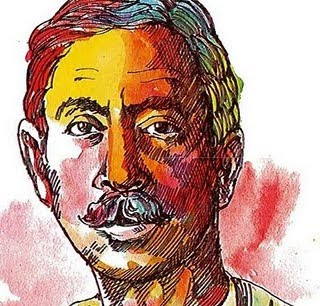Rajinder Singh Bedi (1915-1984) was an eminent progressive Urdu writer, playwright and a Hindi film director, screenwriter and noted dialogue writer.
Some of his best work as a dialogue writer can be seen in Hrishikesh Mukherjee's films Abhimaan, Anupama and Satyakam; and Bimal Roy's Madhumati. As a director he is most known for his films Dastak (1970), starring Sanjeev Kumar and Rehana Sultan and Phagun (1973), starring Dharmendra, Waheda Rehman, Jaya Bhaduri and Vijay Arora.
Rajinder Singh Bedi is considered one of the greatest 20th century progressive writers of Urdu fiction, and second most prominent Urdu fiction writer, after
Saadat Hasan Manto, and like Manto he is most known for his haunting Partition of India tales.
Rajinder Singh Bedi was born near Sialkot, Punjab (now in Pakistan). He spent his early years in Lahore, where he received his education in Urdu, as it was common to most Punjabi families, though he never graduated from a college. After Partition his other family members settled in Fazilka, Indian side of Punjab.
His first short story "Maharani ka Tohfa" won the best Short Story of the Year, given by 'Adabi Dunya', a prominent Urdu monthly, published from Lahore.
He started his career working as a clerk at Lahore Post Office in 1933. In 1941 he joined the Urdu section of All India Radio, Lahore, while working at Lahore radio he wrote many plays including, his famous drama ‘Khawaja Sara’ and 'Nakl-i-Makaani', which he later adapted into his film Dastak in 1970. His first collection of short stories, 'Daan-O-Daam' (The Catch), featuring his prominent story 'Garam Coat' (Warm Coat) was published in 1940. In 1942, he published his second collection of short stories, 'Grehan' (The Eclipse).
His literary career spanning fifty years and 72 short stories was marked with versatility and represented the finest creative writing in Urdu literature. His stories ‘Garm Kot’ and ‘Lajvanti’ are considered among the masterpieces of Urdu short story. His later collections of short stories were 'Kokh Jali' and
'Apne Dukh Mujhe Dedo' and a collection of plays 'Saat Khel’.
In 1943, he joined Maheshwari Films, a small Lahore film studio, though just after one and half year he joined All India Radio back and was posted to Jammu, where he worked till 1947.
By the time of Partition Rajinder Singh Bedi had published numerous more short stories, and had made a name for himself as a prolific writer.
His Urdu novel, 'Ek Chadar Maili Si', translated into English as 'I Take This Woman', received the Sahitya Akademi Award in 1965. The book was later translated into Hindi, Kashmiri and Bengali.
After partition he moved to Bombay, and started working with D. D. Kashyap and got his first screen credit for dialogue, in the 1949 film Badi Bahen. Though he got greater recognition for his second film Daag, a 1952 film.
In 1954, he joined hands with Amar Kumar, Balraj Sahni, Geeta Bali and others to create a new company called 'Cine Cooperative', and together they produced their first film, Garam Coat in 1955. Based on his own short story Garam Coat, starring Balraj Sahni and Nirupa Roy, and directed by Aman Kumar, the film gave Rajinder Singh Bedi, chance write a first entire screenplay.
Their second film Rangoli (1962), starring Kishore Kumar, Vyjayantimala, and Durga Khote, was also directed by Amar Kumar.
He continued to display his exemplary range in dialogue writing styles in many classic Hindi films, starting with Sohrab Modi's
Mirza Ghalib (1954), Bimal Roy’s Devdas (1955), and Madhumati (1958); Amar Kumar and Hrishikesh Mukherjee’s best films, Anuradha (1960), Anupama (1966), Satyakam (1969) and Abhimaan (1973).
But his greater accomplishment in films has been pioneering straight forward and down-to-earth dialogues in Hindi cinema, which were known for its melodrama and extreme rhetoric content.
He made his directorial debut with Hindi classic Dastak (1970), starring Sanjeev Kumar and Rehana Sultan, with music by Madan Mohan, and in the following decade he directed three more films, Phagun (1973), Nawab Sahib (1978) and Aankhin Dekhi (1978).
His writing was known for its sensitivity and earthiness. His classic novella Ek Chadar Maili Si was first made into a film in Pakistan, Mutthi Bhar Chawal (1978) and later in India, as Ek Chadar Maili Si (1986), a rare distinction for an Indian author to have his work picturised on both sides of the border.
His son Narender Bedi was also a Film director and the maker of films like Jawani Diwani (1972), Benaam (1974), Rafoo Chakkar (1975), Sanam Teri Kasam, he died in the 1982. Two years later in 1984, Rajinder Singh Bedi also died, in Bombay.
In his memory, the Government of Punjab has started a 'Rajinder Singh Bedi Award' in the field of Urdu Literature. He has been awarded Sahitya Akademi Award for: Ek Chadar Maili Si ('I Take This Woman') in 1965 and Ghalib Award - Urdu Drama in 1978.














































.jpg)

.jpg)




